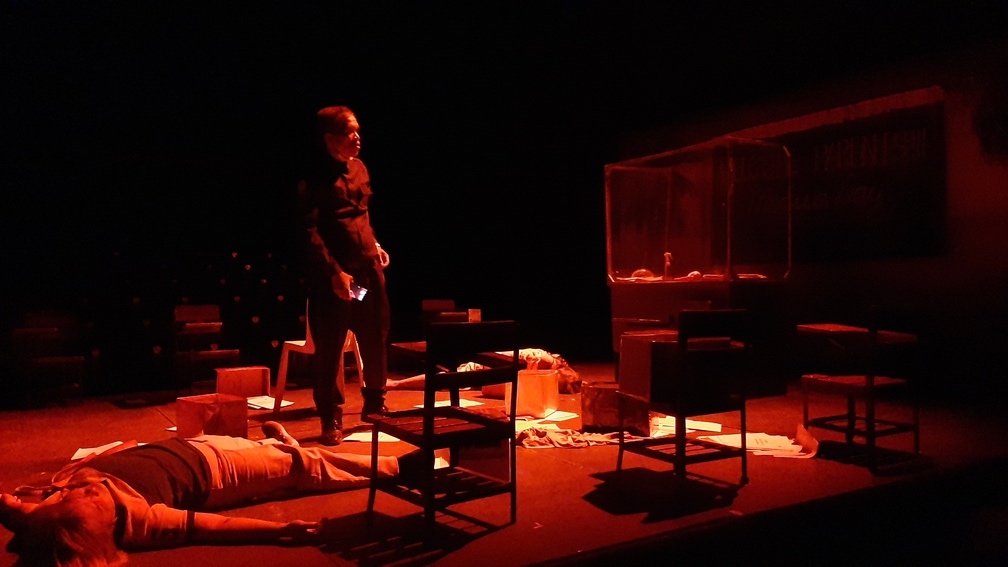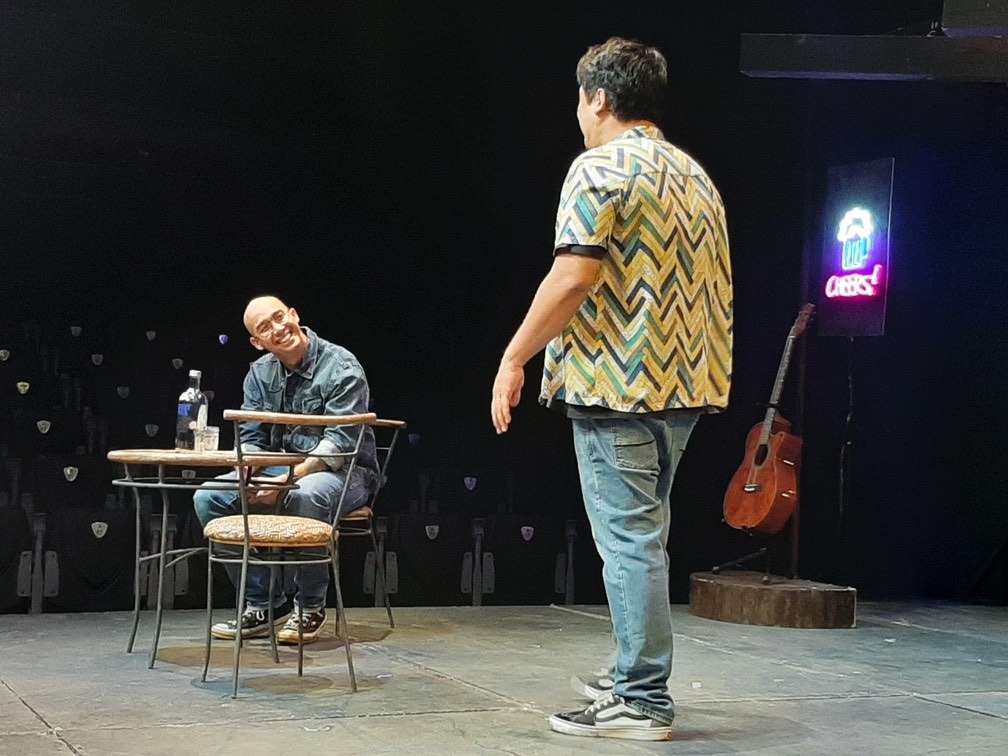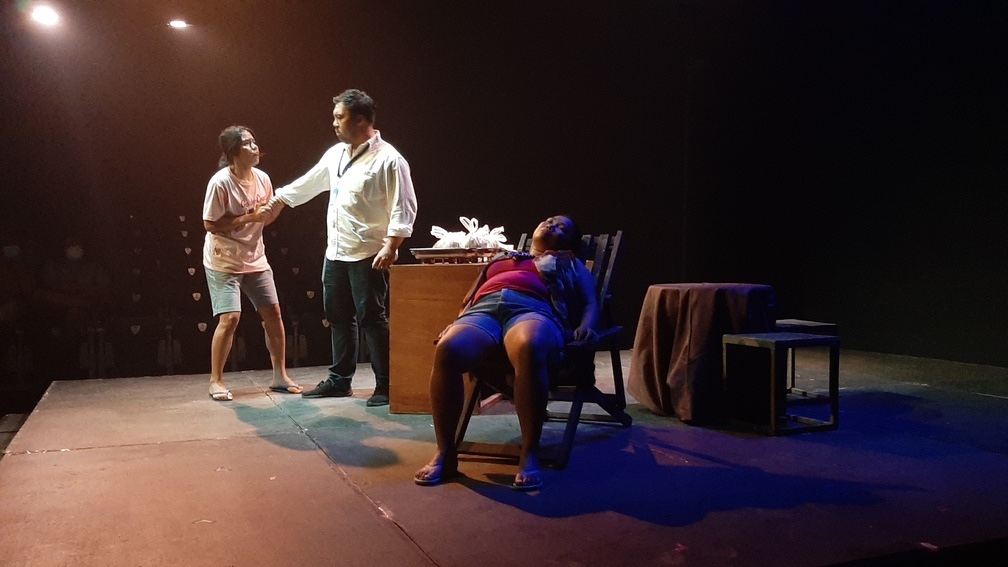REVIEW: Virgin Labfest 18’s ‘Hinog’ bargains with death and grief
Trigger warning: This piece includes a discussion about sexual abuse.
For a theater festival that annually stages “untried, untested, and unstaged plays,” it might be a surprise for one to encounter a retrospective section in the lineup, but such is the risk that Virgin Labfest 2023 takes in resurrecting three of its plays from the previous year.
This extended space, then, allows not only artists behind each production but also audience members to see the artistic differences in each staging after another year of incubation and collaboration, the unfamiliar territories, if any, that each piece dares to navigate, and the possibilities that creative teams imagine outside of craft—all in an attempt to remain critical of every work we produce and consume.
This year’s Set E Revisited: Hinog finds an educator, a mother, a conflicted son, and a family bargaining with death and grief in varying degrees. Each character wrestles with tragedy, whether foreseen or rendered by violent hands. Each story, in many ways, mirrors a present besieged by many losses, stretching from personal to political. It is a set that invites the audience to tear open wounds, no matter how deep and cutting, and ruminate on the entropy of honoring history and memory in hopes of properly healing and moving forward.
Punks Not Dead (written by Andrew Bonifacio Clete, directed by Roobak Valle)

Andrew Bonifacio Clete’s Punks Not Dead, despite its seemingly deceiving title, immediately surfaces this tragedy through the material’s choice of milieu and narrative focus.
Set at the height of the pandemic, the staging tells the story of Bireng (Maria Bagio), who submits a pile of modules to her son’s teacher Mrs. Apple (Via Antonio) at an elementary school. Distraught that her child might be learning dated beliefs, Bireng reaches out to the teacher about an item in a module erroneously declaring that having tattoos, like her own "Punks Not Dead" tattoo, makes one a criminal. Then enters Artur (Paulo Cabañero), the parent-policeman. Bireng and Artur soon find themselves on opposite poles, arguing about trite notions baked into bearing a tattoo. “Wala nga kayong tattoo, pero pumapatay kayo ng tao,” says Bireng in one of their exchanges.
Clete, in collaboration with director Roobak Valle, articulates incredible insights by staking a specificity in the material, openly exhuming the country’s state under the Duterte regime: from the ruthless war on drugs, the inoperative pandemic response, the education crisis, to the state terror that is likely to continue. Double meanings carried by words like “item” and “bigayan,” details like Bireng’s bag marked with DU30 initials, and the use of spray bottles and masks make this messaging more pronounced—aspects of the show that are enhanced by Julia Pacificador’s set design.
The work that the ensemble turns in expertly ties the narrative together, with Bagio, Antonio, and Cabañero mastering each character’s depth and dimension, physicalizing the humor scattered throughout the play, and parsing the truth amidst the bubble of safety.
The story sets its hilarity from the get-go, but when all of this begins to dissipate, Punks Not Dead holds us at gunpoint, forcing us to confront head-on the patterns of neglect and impunity perpetually whitewashed by so many complicit hands—a final image rendered more violent by Roman Cruz’s lighting design, inundating everything in red.
Fermata (written by Dustin Celestino, directed by Toni Go-Yadao)

Like Layeta Bucoy’s Tuloy Ang Palabas, Dustin Celestino—writer of Fermata—also presents a story that touches on sexual violence. The play sees childhood friends Ben (Cris Pasturan) and Alex (Paolo O’Hara) reuniting at a jazz bar after a long while, as the former hopes to expose the abuses and predatory behavior of his father, a renowned figure in the music industry who just recently passed, only to open more wounds in the process.
Once this premise is uncoiled, one cannot help but draw parallel connections to the decades-long abuses, all incisively detailed in a VICE World News report, at a prestigious art school in the Philippines. Stories of assault and harassment, sadly, are commonplace in the local art scene, and Fermata uproots this reality by spotlighting how calls for justice, at times, become tricky when it is done at the expense of victims and survivors, as embodied by Alex, who resorts to concepts like false memories and alternate universes to cope with his own trauma.
Overlapping dialogue, silence, and long pauses heavily inform the direction of Toni Go-Yadao—a decision that emphasizes the tension between the characters, the complexities of the male ego, and how trauma is always so difficult to crack open. Yet, it is the same decision that affects the play’s pacing and, to an extent, dilutes what it strives to say. There are moments when one cannot distinguish if the actors’ reactions are deliberate, or if they simply forget what to say or do next. This artistic choice meant to present the painfulness of the whole process of resurfacing irreparable fractures and fissures just eventually becomes painful to watch, as it overwhelms the viewers with the burden of the confession.
In the end, what can be gleaned from Fermata, despite the lapses, is how it excavates these contradictions and gray areas between healing and accountability, between listening and taking action, between remembering and moving forward.
Nay, May Dala Akong Pancit (written by Juan Ekis, directed by Karl Jingco)

Last May 28, I was supposed to see the 20th-anniversary production of Juan Ekis’ Twenty Questions organized by Theater Titas PH, only for sickness to get in the way. It was the work that first introduced me to the playwright, and experiencing it being brought to life onstage would have been marvelous. Yet I’m glad that I missed the show, precisely because it led me to Nay, May Dala Akong Pancit, which is hands down the best staging from any production that I’ve seen this year.
The play centers around Mae (Manok Nellas-Bagadiong) and her brother (Lian Silverio), who have connected the dots and found out that they are caught in a metaphysical loop in which their mother (Joann Yap-Co) dies every time they bring home pancit, and they exhaust all means to avert the tragedy, despite the pancit relentlessly finding its way back to this absurd case of homicide—ordered via Grab, prepared by their mother, brought home as a pasalubong, carried by a holdaper, or dropped by a supernatural force—scenes that are enlivened by Tommy Alejandrino, who plays a number of supporting characters.
As the title warrants, one might reckon that the play might just rehash such a worn-out Pinoy soap opera trope, but it is far from that. If anything, it answers with a firm and resounding no. What separates Nay, May Dala Akong Pancit not only from its set but also from the rest of the pieces in this year’s Virgin Labfest is its inventiveness, its daring attempt at challenging the durability of the form and, by extension, the possibilities that theater can reach, disproving any claim that this is just sheer gimmick.
Director Karl Jingco’s ingenious sleight of hand and Ekis’ solid script operate beyond just pushing the material forward but, more importantly, elevating it to greater, riskier heights, unafraid to shift between genres—drama, horror, musical, and even improv—break the fourth wall, and allow audience members to have a chance at forging their own ending, which is perhaps its little way of recognizing the very people that move creatives to produce better work.
Whatever this staging has achieved will, of course, not be possible without Io Balanon’s set design, Loren Rivera’s lighting, and TJ Ramos’ sound work that make the entire experience more lived-in, the humor more punching, and the emotional heft more sincere.
But what Nay, May Dala Akong Pancit shows us, at its core, is a fairly simple yet disarming message: how we refuse to play the cards we are dealt, especially when it comes to the people we love; how we try, in so many ways, to trick time and death; and how we deny the weight of grief, until all that is left is to confront the inevitable, to finally allow ourselves to feel the pain, the very first step to healing. It tells us that, indeed, “to be loved is to be changed.”
If it isn’t any clearer, Nay, May Dala Akong Pancit is a piece to dwarf all others—the best way to conclude this year’s Virgin Labfest.


